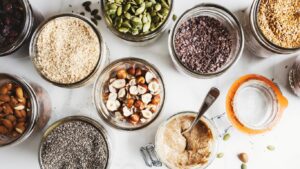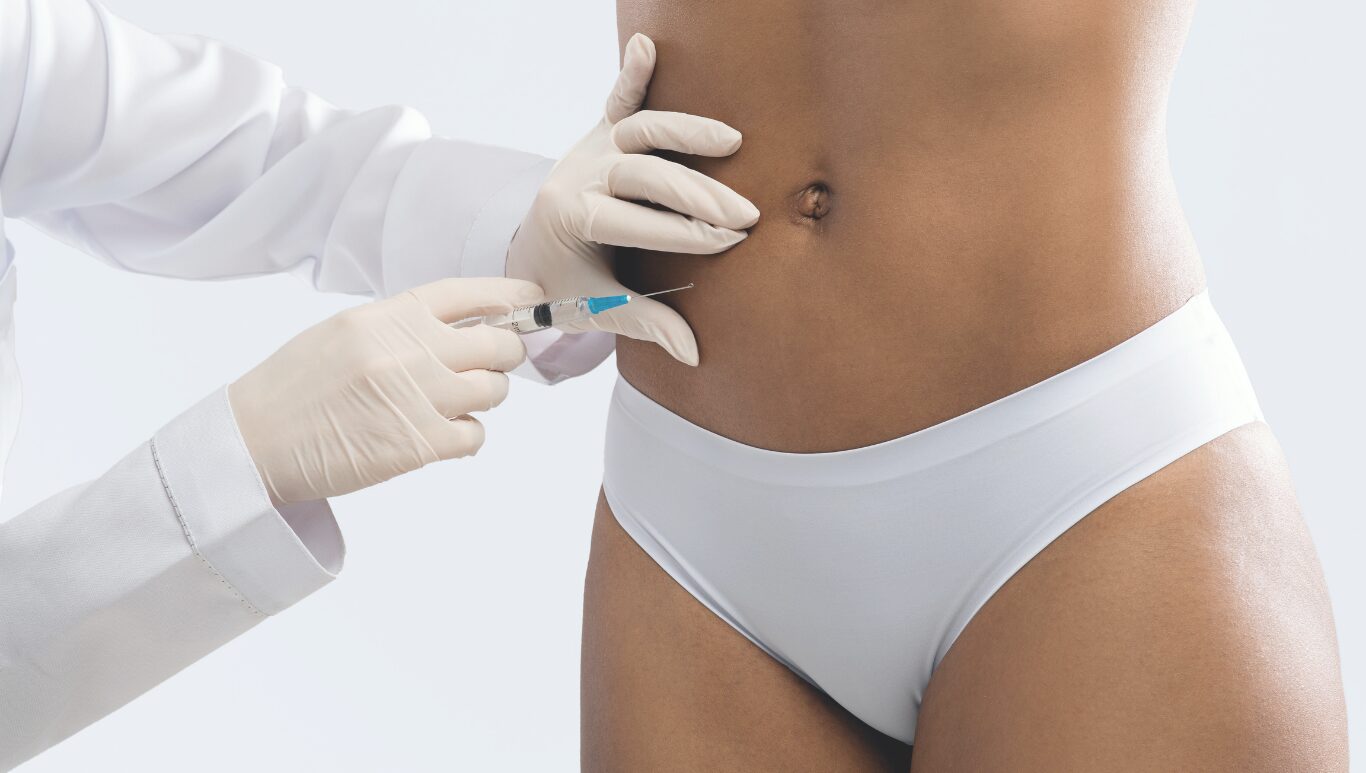Premenstrual syndrome (PMS) is a common condition that affects up to 75% of women of reproductive age. It is characterized by a variety of physical, emotional, and behavioral symptoms that impact women in the luteal phase of their menstrual cycle which are days leading up to their menstruation. Symptoms of PMS can include abdominal cramps, bloating, breast tenderness, fatigue, headaches, mood swings, irritability, anxiety, and depression. These symptoms can range from mild to severe varying from person to person, affecting the quality of life of women.
While there are several treatments available for PMS, many women prefer to use natural remedies to alleviate their symptoms. Turmeric and ginger are two natural remedies that have gained popularity for their potential benefits in treating PMS symptoms.
In this article, we will discuss the potential benefits of turmeric and ginger for PMS along with reviewing some of the scientific studies supporting these claims and how these spices can be incorporated into one’s diet.
TURMERIC FOR PMS
Turmeric, also known as Curcuma longa, is a spice commonly used in Indian and Southeast Asian cuisine and has a long history of use in traditional medicine. The active compound in turmeric is called curcumin, which has been shown to have anti-inflammatory, antioxidant, and neurotransmitter-modulation properties. It has been studied for its potential health benefits, including its effects on premenstrual syndrome. Read on to know which benefits curcumin can offer for premenstrual syndrome.
- Reduces inflammation: Curcumin has potent anti-inflammatory properties that can help to reduce inflammation and pain associated with PMS.
- Relieves menstrual cramps: Turmeric is effective in reducing menstrual cramps and pain, which are common symptoms of PMS.
- Balances hormones: Turmeric may help to balance hormones in the body, which can alleviate PMS symptoms such as mood swings and irritability.
- Improves digestion: Turmeric can help to improve digestion and reduce bloating, which are common PMS symptoms.
- Boosts mood: Turmeric has been found to have mood-boosting effects, which can help to alleviate PMS-related mood swings and depression.
In a randomized, double-blind, placebo-controlled trial published in the journal Complementary Therapies in Medicine to evaluate the effects of curcumin on the severity of PMS symptoms, researchers found that women who took a curcumin supplement in form of two capsules (100g/12h) daily for seven days before menstruation and for three days after menstruation for three successive cycles experienced a significant decrease in the severity of their PMS symptoms compared to those who took a placebo. The study found that curcumin was effective in reducing physical symptoms such as breast tenderness, headache, bloating, backache, muscle stiffness, nausea, and abdominal pain, behavioral symptoms such as lack of energy, fatigue, difficulty in concentrating, and insomnia as well as emotional symptoms such as anxiety, restlessness, irritability, crying, depression and feeling of isolation. This was possible because of the modulation of neurotransmitters and anti-inflammatory effects of curcumin.
Several other studies are also of the view that curcumin can reduce the severity of symptoms of premenstrual syndrome and is a safe and effective remedy for combating this issue. More research will help in fully understanding the effects of turmeric on premenstrual syndrome and determining the optimal dose and form of turmeric to use for maximum benefits.
GINGER FOR PMS
Ginger, also known as Zingiber officinale, is a spice commonly used in Indian, Asian, and Middle Eastern cuisine. It has been traditionally used for medicinal purposes for thousands of years, and there is some evidence to suggest that it may be beneficial for premenstrual syndrome (PMS). The active compound in ginger is called gingerol, which offers major of its health benefits.
Here are some potential benefits of ginger for PMS:
- Reducing inflammation: Ginger contains compounds that have anti-inflammatory properties, which may help alleviate some of the symptoms of PMS, such as bloating, cramping, and mood changes.
- Relieving pain: Ginger has been shown to have pain-relieving properties, which may help alleviate menstrual cramps and other PMS-related pains. A double-blind comparative clinical trial conducted in 2009 found that ginger supplementation in form of 250 mg ginger powder four times daily for three days significantly reduced the severity and duration of menstrual pain and cramps in women with PMS. The researchers concluded that ginger could be a safe and effective treatment for menstrual pain and cramps in women with PMS and found it even comparable to the pain-relieving mefenamic acid or ibuprofen capsules in terms of pain relief, and satisfaction with the treatment.
- Improving digestion: Ginger has been used traditionally to aid digestion and may help alleviate symptoms such as bloating, gas, and constipation, which are common during PMS.
- Reducing nausea: Ginger is effective at reducing nausea and vomiting, which may be particularly helpful for women who experience these symptoms during PMS.
- Regulating menstrual cycle: There is some evidence to suggest that ginger may help regulate the menstrual cycle, potentially reducing the severity of PMS symptoms over time.
Overall, more research will help in fully understanding the benefits of ginger for PMS and the various doses and duration of treatment, still, ginger appears to be and is considered a safe and effective natural remedy for many women with PMS symptoms.
INCORPORATING TURMERIC AND GINGER INTO YOUR DIET:
Turmeric and ginger can easily be incorporated into one’s diet in various ways.
- One common way is to use them as spices in cooking. Turmeric can be used to flavor curries, soups, and stews, while ginger can be used in stir-fries, marinades, and teas.
Another way to consume turmeric and ginger is by making turmeric and ginger tea. To make the tea, simply slice fresh ginger and add it to a pot of boiling water with a teaspoon of turmeric powder. Let it simmer for 10-15 minutes, strain, and enjoy.
Turmeric and ginger supplements are also available in capsule or powder form for those who prefer to take them in concentrated doses.
POTENTIAL SIDE EFFECTS AND PRECAUTIONS:
While turmeric and ginger are generally considered safe, they may cause side effects in some people.
- Turmeric may cause stomach upset, nausea, and diarrhea when taken in high doses. It may also interact with certain medications, such as blood thinners and diabetes drugs.
- Ginger may cause stomach upset, heartburn, and diarrhea when taken in high doses. It may also interact with certain medications, such as blood thinners and blood pressure drugs.
Therefore, it is important to speak with a healthcare professional before taking turmeric or ginger supplements, especially if you are taking any medications or have any underlying health conditions.
KEY TAKEAWAY
Turmeric and ginger offer promising benefits for women suffering from PMS symptoms. The anti-inflammatory, antioxidant, gut-friendly, and neurotransmitter-modulating properties of these spices make them potential candidates for relieving menstrual pain and cramps, reducing anxiety and depression, and alleviating nausea and vomiting. However, further research will help in endorsing these findings and confirming optimal dosages.
Turmeric and ginger are considered safe and can easily be incorporated into one’s diet. Therefore, women who suffer from PMS symptoms may consider adding turmeric and ginger to their diet or taking supplements under the guidance of a healthcare professional.
References:
Khayat S, Fanaei H, Kheirkhah M, Moghadam ZB, Kasaeian A, Javadimehr M. Curcumin attenuates the severity of premenstrual syndrome symptoms: A randomized, double-blind, placebo-controlled trial. Complement Ther Med. 2015 Dec;23(6):735-40. doi: 10.1016/j.ctim.2015.08.001. Epub 2015 Aug 26. PMID: 26645531.
Shidfar F, Ostadrahimi A, Mashhadi NS, et al. The effects of ginger on fasting blood sugar, hemoglobin A1c, apolipoprotein B, apolipoprotein A-I and malondialdehyde in type 2 diabetic patients. Iran J Pharm Res. 2015;14(1):131-140.
Rahimikian F, Rahimi R, Golzareh P, Bekhradi R, Mehran A. Curcumin for the treatment of major depression: A randomized, double-blind, placebo-controlled study. Phytother Res. 2018;32(2):301-309.
Ozgoli G, Goli M, Moattar F. Comparison of effects of ginger, mefenamic acid, and ibuprofen on pain in women with primary dysmenorrhea. J Altern Complement Med. 2009;15(2):129-132.
Jamali F, Mosalaei A, Najafi Ghezeljeh T, Sharififar F, Safiallahy S, Jalili C. Effects of ginger on primary dysmenorrhea: A randomized controlled trial. Pain Manag Nurs. 2014 Dec;15(4):826-33. doi: 10.1016/j.pmn.2013.09.012. Epub 2014 Mar 22. PMID: 24661882.
Kashefi F, Khajehei M, Alavinia M, Golmakani E, Asili J. Comparison of the effectiveness of ginger and mefenamic acid in the treatment of primary dysmenorrhea: A randomized clinical trial. J Med Food. 2014;17(12):1361-1367. doi:10.1089/jmf.2013.3010.
Ma W, Zhang X, Wang Y, Zhang J, Zhang T. Curcumin ameliorates oxaliplatin-induced peripheral neuropathy: A meta-analysis of randomized controlled trials. Phytother Res. 2020;34(10):2579-2586. doi:10.1002/ptr.6776.
Nurtjahja-Tjendraputra E, Ammit AJ, Roufogalis BD, Tran VH, Duke CC. Effective anti-platelet and COX-1 enzyme inhibitors from pungent constituents of ginger. Thromb Res. 2003;111(4-5):259-265. doi:10.1016/j.thromres.2003.08.012.
National Center for Complementary and Integrative Health. Ginger. Updated August 2020. Accessed February 22, 2023. https://www.nccih.nih.gov/health/ginger











